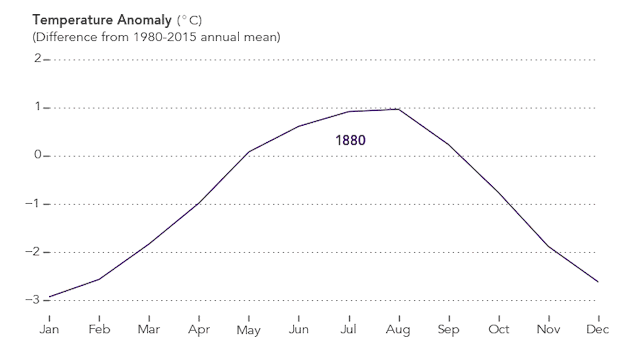NASA just analysed temperature records for August 2016, and has announced that not only was last month the hottest August on record - it also ties with July 2016 as the hottest month ever since meteorological records began in 1880.
So, good job, humans, we just made it through what looks to be the two hottest months in human history.
If your déjà vu is kicking in, don't worry, you have heard all this before, kinda.
Just last month, we reported that July 2016 was the hottest month on record - some 0.84˚C (1.27˚F) warmer than the 1950-1980 global average, and 0.11˚C (0.2˚F) degrees hotter than the previous hottest-ever months.
July 2016 also happened to mark the 10th consecutive month of record-breaking heat across the globe, with June 2016 being the hottest June on record, May 2016 being the hottest May on record, and so on, all the way back to October 2015, according to NASA's records.
The US National Oceanic and Atmospheric Administration (NOAA) uses a slightly different measure to figure out global average temperatures, and has calculated that before July 2016, there have actually been 14 consecutive record-breaking months.
According to the NOAA's records, the hot streak actually goes back to May 2015.
"The scary thing is that we are moving into an era where it will be a surprise when each new month or year isn't one of the hottest on record," Chris Field, a climate scientist at the Carnegie Institution and Stanford University, told News.com.
And how right he was, because August came and went, and now August is the 11th consecutive hottest month on record.
The difference here is that when we were talking about July 2016, the previous record-holders for the hottest month known to science were July 2015 and July 2011. This time, the previous record-holder wasn't one or five years ago, it was last month.
"Although the seasonal temperature cycle typically peaks in July, August 2016 wound up tied with July 2016 for the warmest month ever recorded," NASA reports. "August 2016's temperature was 0.16 degrees Celsius warmer than the previous warmest August in 2014."
What's perhaps most concerning about this news - even more so than the fact that we've just experienced the two hottest months on record back-to-back - is that August was when experts predicted something of a cool-down.
As Andrea Thompson points out over at The Guardian, it was thought that July 2016 would likely be the last record hot month of the year, given the dissipation of El Niño, which is typically associated with a sustained period of warming in the central and eastern tropical Pacific.
While NASA notes that it's important to keep these individual records in perspective, because one, two, or even 11 record-breaking months don't give us nearly enough data to start making assumptions about worldwide trends related to a 4.5-billion-year-old planet, longer-term trends have been carrying pretty much the same message.
"Whether one year is 0.1 degree warmer than any other - it doesn't mean too much," Gavin Schmidt, director of NASA's Goddard Institute of Space Studies, told Robinson Meyer at The Atlantic.
"The main issue is the longterm trend shows the planet is 1 degree Celsius - almost 2 degrees Fahrenheit - warmer than it was during the 19th century. That has a very large impact on polar ice, on agriculture, on coastal erosion, on water safety. It's a century-long trend at this point."
You can see that trend in action here:
 NASA
NASA
And if you've got a friend who's still not convinced that something very bad and human activity-related is going on here, because "the climate has been changing throughout Earth's 4.5-billion-year history", the guys from xkcd have something to show them.
The bottom line is that hottest months on record can't tell us much in the grand scheme of things, but in this case, they just so happen to be reflecting a much larger, and far more concerning reality - that Earth has never experienced warming like this before, and so far, we're doing a pretty terrible job at mitigating that.
"We like anniversaries and records, but what the world is doing while we talk is changing," says Schmidt. "And that's the big takeaway."
